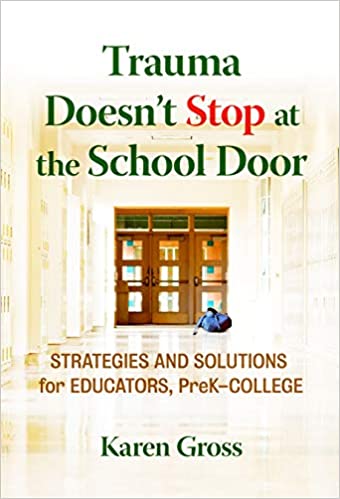Trauma Doesn’t Stop at the School Door: Strategies and Solutions for Educators, PreK-College explores how educational institutions have failed to recognize and effectively address the symptoms of trauma in students of all ages.
Given the prevalence of traumatic events in our world, Gross argues that it is time for educational institutions and those who work within them to change their approaches and responses to traumatic symptoms that manifest in students in schools and colleges.

These changes can alter how and what we teach, how we train teachers, how we structure our calendars and create our schedules, how we address student behavior and disciplinary issues, and how we design our physical space. Drawing on real-life examples and scenarios that will be familiar to educators, this resource provides concrete suggestions to assist institutions in becoming trauma-responsive environments, including replicable macro- and microchanges.
This session will focus specifically on how to reopen schools post-COVID-19 closure, even institutions that have done online or other forms of learning during the “COVID-Gap.”
Attention will be paid to wide ranging issues including:
- How to deal with the physical plant/classroom (what’s on the walls and halls; are desks emptied; are cubbies and lockers renamed and/or cleaned out; can classes be combined).
- How to meet and greet returning students and their families in the first week.
- What to expect in terms of student, parent, and teacher behavior.
- How to create trauma responsive pedagogy (what materials should be used/deleted
- How will student learning be assessed.
- Will students stay back or go forward in terms of grade levels.
- How teachers, staff, and administrators can and should plan for the re-opening.
Concrete activities and approaches will be provided and there will be ample opportunity for give and take and questions.
Registration
The summer 2020 series of Beyond the Book with Karen Gross will be comprised of four sessions from 3:00 – 4:15 p.m. EDT throughout the span of one week on the following dates:
- Monday, July 20
- Tuesday, July 21
- Wednesday, July 22
- Thursday, July 23
The registration fee will be $250 per person (cost of book not included). Space is limited and available on a first-come, first-served basis. Interested in having multiple members of your team participate? Discounted pricing will be available for groups of three (3) or more.
REGISTER TODAY
About Karen Gross

Karen Gross is an author, educator, and advisor to nonprofit schools, organizations, and governments. Her work focuses on student success with a specialization in trauma, its symptomology, and approaches to its amelioration. She has worked with institutions planning for and dealing with person- and nature-made disasters including shootings, suicides, immigration detention, family dysfunction, hurricanes, and floods.
She currently serves as Senior Counsel to Finn Partners, is an instructor in continuing education at Rutgers University Graduate School of Social Work, and sits on the Advisory Council at the Center for Minority Serving Institutions at Rutgers. She is also a Visiting Professor at Bennington College and artist-in-residence at Molly Stark Elementary School (VT).
A frequent voice on education issues across the preK–20 pipeline, Gross is the award-winning author of Breakaway Learners: Strategies for Post- Secondary Success and Failure and Forgiveness: Rebalancing the Bankruptcy System. She is also the author of a trauma-sensitive children’s book series, Lady Lucy’s Quest.
She served for eight years as President of Southern Vermont College and as Senior Policy Advisor to the U.S. Department of Education during the Obama Administration. Prior to that, she was a tenured law professor for 22 years in NYC. She has also served on numerous local, regional, and national boards, including Campus Compact, New England Board of Higher Education, and the Sage Colleges.
Praise for Trauma Doesn’t Stop at the School Door
“Karen Gross has authored a remarkable book that paves the way for each of us to become trauma-responsive in our own lives and in the daily life and future of the schools, institutions, and communities in which we live and work. This book is both scholarly and practical, enabling us better to understand the research, evidence, and effects of trauma and the positive steps we can take to address its many impacts. She offers us extraordinary insights and solutions to build and sustain safe, thriving environments that can reduce both the frequency of traumatic incidents and traumatic stress on individuals and communities. The book is a treasure trove of ideas and strategies that teachers, parents, students, and leaders of any organization can leverage to make positive transformational changes across the nation.”
—Martha J. Kanter, Executive Director, College Promise Campaign; U.S. under secretary of education (2009–2013)
“Trauma Doesn’t Stop at the School Door is a treasure trove of information on trauma as well as thoughtful recommendations for schools, from pre–K through college, to counteract negative consequences of trauma in their students. Both very readable and comprehensive, the book contains big picture solutions, like re-designed school layouts, and is a gold mine of practical ideas for any educator to lessen trauma’s effect on learning. Dr. Gross utilizes her own experiences and those of others to unfold a convincing scenario for more effective schools in our trauma-affected era. I heartily recommend this book to today’s colleges of teacher education, as well as educators everywhere.”
—Kathleen Ross, President Emeritus and Professor of Cross-Cultural Communication, Heritage University
A version of this article first appeared here.








Comments